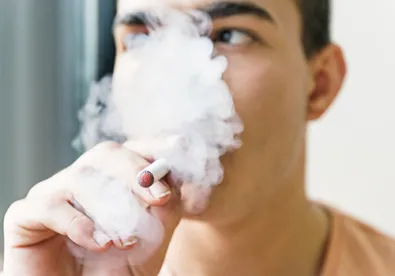On March 27, 2018, a coalition of public health organizations including the Campaign for Tobacco-Free Kids, the Truth Initiative, the American Cancer Society and the American Academy of Pediatrics, among others, as well as several individual physicians (collectively the “NGOs”) filed a lawsuit in the United States District Court for the District of Maryland challenging the Food and Drug Administration’s (“FDA’s”) ability to extend the compliance policy deadlines for premarket authorization applications for deemed tobacco products (Case No. 8:18-cv-00883). On July 10, 2018, the NGOs filed a motion for summary judgment, available here.
The case challenges FDA’s August 2017 Guidance Document, Extension of Certain Tobacco Product Compliance Deadlines Related to the Final Deeming Rule (the “Guidance”) which, among other things: (1) extended the deadlines for premarket applications for deemed tobacco products, such as e-liquids and vapor products, as well as cigars, hookah, and pipe tobacco; and (2) ended the one-year “sunset provision” in the initial compliance policy, permitting manufacturers to continue marketing deemed products that are the subject of timely filed premarket applications that have been accepted by FDA for scientific review.
The NGOs make three main arguments: (1) the Guidance unlawfully authorizes manufacturers to continue marketing newly-deemed tobacco products without obtaining the required FDA marketing order, contrary to the requirements of the Family Smoking Prevention and Tobacco Control Act (“TCA”); (2) the Guidance is an administrative “rule” and FDA issued it without providing the public notice and an opportunity to comment in violation of the Administrative Procedure Act (“APA”);[1and (3) the Guidance is arbitrary and capricious because it provided inadequate justification for suspending premarket review and did not account for the public health cost of the continued marketing of unreviewed new tobacco products. The NGOs seek to have the Guidance vacated, which could prove disastrous for the vapor industry.
We summarize the NGO’s motion in more detail below.
Background on Premarket Authorization and FDA Compliance Policy for Deemed Tobacco Products
When the “Deeming Rule” became effective on August 8, 2016, the FDA extended its tobacco product authority to previously unregulated categories of products including, but not limited to, e-liquids and vapor products, as well as cigars, hookah, pipe tobacco and heat-not-burn products.[2] Deemed tobacco products are now subject to the Federal Food, Drug and Cosmetic Act (“FDCA”), as amended by the TCA, including, most critically, the requirement that all new tobacco products obtain FDA premarket authorization. A new tobacco product is any product introduced or modified after the February 15, 2007 “grandfather date”. Because there are no known grandfathered e-liquids or vapor products, all such products, including those that have been on the market for years, are required to obtain FDA marketing authorization through the onerous Premarket Tobacco Product Application (“PMTA”) process, which is separately being challenged by the vapor industry.[3]
In the preamble to the Deeming Rule, although it chose not to amend the grandfather date for deemed products, FDA included a “compliance policy” which effectively created marketing grace periods for newly deemed, finished tobacco products that do not have FDA premarket authorization.[4] Pursuant to the compliance policy, manufacturers were permitted to continue marketing e-liquids and vapor products in the U.S. that were on the market on August 8, 2016 until the end of the compliance period, at which time a PMTA would be due. Initially, this compliance period was only 24 months after the effective date of the rule, meaning PMTAs would have been due by August 8, 2018 for all vapor products.[5]
Further, the initial compliance policy created a marketing sunset period that permitted manufacturers of products for which premarket applications were submitted to continue sales for only an additional 12 months, pending FDA review of the applications. After that, if FDA had not yet ruled on an application, it would “consider, on a case-by-case basis, whether to defer enforcement of the premarket authorization requirements for a reasonable time period.”[6] In other words, companies that submitted PMTAs for vapor products by August 8, 2018 would only be permitted to continue marketing the subject products until August 8, 2019, after which they would have to remove the products from the market while FDA reviewed the applications, no matter how long that would take, unless the Agency granted an exception.
However, in July 2017, FDA announced a new “comprehensive regulatory plan to shift the trajectory of tobacco-related disease, death” that, among other things, extended the premarket application compliance period for non-combustibles, including e-liquids and vapor products, until August 8, 2022. In other words, those products on the market as of August 8, 2016 can now remain on the market at least until August 8, 2022; after that date, only products that are the subject of PMTAs that have been accepted for review can remain on the market. FDA also eliminated the 12-month sunset period, allowing companies to continue marketing products while FDA reviews the PMTAs. FDA formalized the new deadlines in its August 2017 Guidance.
Argument No. 1: The Guidance’s authorization to continue marketing newly-deemed tobacco products without the required FDA marketing order is contrary to the requirements of the TCA.
The NGOs argue first that the Guidance is contrary to the mandates of the TCA. They emphasize that the TCA directs that an FDA order authorizing a manufacturer to sell a new tobacco product “is required” before that product “may be introduced or delivered for introduction into interstate commerce.”[7] Therefore, the NGOs argue, both the Guidance’s extension of PMTA deadlines and its compliance policy effectively grant permission to market new tobacco products before FDA authorizes their sale, contrary to the TCA’s requirements.
The NGOs further note that the TCA requires that, “as promptly as possible, but in no event later than 180 days after receipt of a PMTA,” FDA “shall” issue an order that the new product may or may not be introduced.[8] The NGOs argue that this requirement renders the Guidance’s revised compliance policy unlawful because the policy permits the indefinite sale of new tobacco products without FDA ever having to complete premarket review.
The NGOs also address a defense likely to be invoked by FDA—that of “enforcement discretion,” the principle that, in the absence of statutory text to the contrary, executive agencies prioritize their own obligations, thereby reserving to their discretion the ability to effectively delay enforcement. The NGOs argue that the TCA does not grant FDA discretion to delay and that publishing a new policy that authorizes conduct Congress made unlawful is not within an agency’s enforcement discretion as the term is understood by courts.
Argument No. 2: The Guidance is a “rule” and FDA issued it without providing the public notice and an opportunity to comment in violation of the APA.
Second, the NGOs contend that the Guidance is effectively a final rule and thus must undergo the procedural requirements of a rule, including the obligation to give the public notice of the proposed rule and an opportunity to make comments.[9]
The NGOs argue that the Guidance is a “rule” within the meaning of the APA because it affects the “rights and obligations” of stakeholders and “constrains the agency’s discretion.”[10] According to the NGOs, the Guidance creates a “right” to market products for several years without a marketing order from FDA and constrains FDA to engage in a premarket review or to bring enforcement actions against manufacturers marketing new products without first obtaining an order. The NGOs dismiss the Guidance’s disclaimer language that it is not “binding” by citing to case law stating that courts look at the “actual function and effect” of guidance over how it labels itself.
Argument No. 3: The Guidance is arbitrary and capricious because it provided inadequate justification for suspending premarket review and did not account for the public health cost of the continued marketing of unreviewed new tobacco products.
Continuing under the premise that the Guidance is a “rule” and thus a “final agency action” as those terms are defined by APA case law, the NGOs argue that the Guidance must be struck down because it is “arbitrary and capricious.”[11] An agency action is arbitrary and capricious under the APA if it is not the product of reasoned agency decision-making.
The NGOs maintain that FDA did not advance an explanation for the Guidance. Agencies must consider factors considered important by Congress when passing the law and other important aspects of the problem addressed by the statute (the TCA in this case).[12] Further, an agency must show that there are good reasons for a change in policy.[13] FDA published a press release before the Guidance explaining industry’s need for more time to comply with PMTA deadlines,[14] but the NGOs allege that the press release’s reasoning is vague and insufficient and therefore not persuasive.
Finally, the NGOs argue that the Guidance’s effect ultimately has a detrimental impact on public health, particularly youth. The NGOs assert that the detrimental effect to public health outweighs any advantage gained by the Guidance’s effects.
Potential Impact on the Vapor Industry
If successful, the NGO’s lawsuit, which paints an unfavorable, and inaccurate, portrait of a vapor industry bent on targeting and addicting minors could have a devasting impact for vapor companies. If the Guidance is vacated, for example, and the original compliance policy reinstated, vapor products without grandfathered status or premarket authorization, of which there are none, may have to be immediately removed from the market. This would not only be potentially devasting to the public health, as millions of vapers may go back to smoking cigarettes, but it would also put thousands of small companies out of business.
The case has been assigned to Judge Paul Grimm of the United States District Court for the District of Maryland. FDA’s response to the motion is due August 7, 2018. We will keep readers of this blog updated on the progress of the lawsuit and will provide a summary of FDA’s response.
[1] 5 U.S.C. § 551 et seq.; 5 U.S.C. § 553.
[2] Deeming Tobacco Products to be Subject to the Federal Food, Drug, and Cosmetic Act, as Amended by the Family Smoking Prevention and Tobacco Control Act; Restrictions on the Sale and Distribution of Tobacco Products and Required Warning Statements for Tobacco Products, 81 Fed. Reg. 28,974 (May 10, 2016).
[3] Alternative premarket authorization pathways exist through submission of Substantial Equivalence (“SE”) Reports and SE Exemption Requests, but those pathways require reference to a grandfathered or predicate tobacco product, and thus are not available for the e-liquids and vapor products.
[4] 81 Fed. Reg. at 28,978.
[5] 81 Fed. Reg. at 28,978.
[6] 81 Fed. Reg. at 28,978.
[7] 21 U.S.C. §§ 387j(a)(2), (c)(1)(A)(i).
[8] 21 U.S.C. § 387j(c)(1)(A).
[9] N.C. Growers’ Ass’n, Inc. v. UFW, 702 F.3d 755, 764 (4th Cir. 2012).
[10] Chrysler Corp. v. Brown, 441 U.S. 281, 302 (1979) (internal quotation omitted); McLouth Steel Prods. Corp. v. Thomas, 838 F.2d 1317, 1320 (D.C. Cir. 1988).
[11] 5 U.S.C. § 706(2)(A).
[12] Motor Vehicle Mfrs. Ass’n of US., Inc. v. State Farm Mut. Auto Ins. Co., 463 U.S. 29, 43 (1983).
[13] FCC v. Fox Television Stations, Inc., 556 U.S. 502, 515 (2009).
[14] FDA News Release, “Protecting American Families: Comprehensive Approach to Nicotine and Tobacco,” https://www.fda.gov/NewsEvents/Speeches/ucm569024.htm (July 18, 2017) (last accessed: 08/02/18).





 />i
/>i

